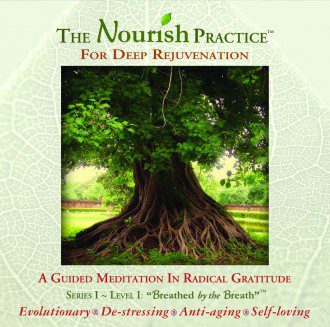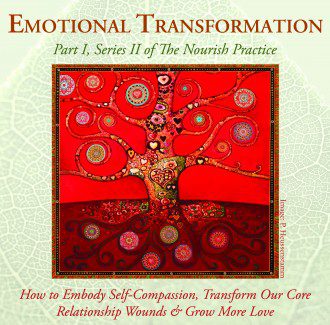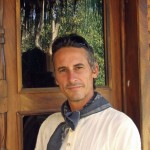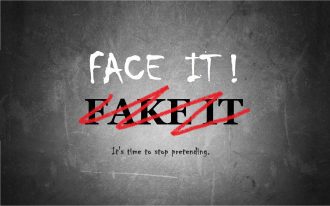Contributing writer for Wake Up World
Self-honesty is the most important kind of honesty because true change and healing cannot happen without it.
When we are emotionally triggered or challenged by something someone says, logic and honest self-reflection have a hard time sinking in. When in a dispute or disagreement with someone who will not see the facts, and who keeps shooting down your logic, we can feel helpless to get them to reckon with reality.
After years of meditating on this dynamic and trying just about everything to get through someone’s defenses, the best way I know to approach such an impasse, is to ask them: “When you vulnerably look into your heart with an honest mind, what truth do you find there?”
The reason for this approach is that no amount of logic is going to get another (or 99% of folks) to see the light when they have an emotional investment about facts that counters their existing framework of reality. This is called cognitive dissonance: an inability to believe what contradicts current knowledge, often because it’s just too scary to turn one’s world upside down with new knowledge. Few people are willing to be their own skeptic.
We cannot break through cognitive dissonance with logic, unless someone is willing to address the underlying emotional fear of what causes them to reject what they hear. And, the more you press against this resistance, the more they shut out the only thing that might actually wake them up. This is why the only solution might be to ask them to look honestly into their heart—because only they are able to bypass their defenses.
Yet, the brave, the few, those who have integrity and a soulful hankering for truth—and are willing to suffer to be aligned with reality—will accept discomforting and disorienting cognitive dissonance over the fear of rejecting new truths just because the latter bring up too much fear. Essentially, when we care about discovering the truth more than protecting our worldview, the pain of denying truth is more painful than facing it. What makes this pain of denial more or less painful is one’s moral compass. The few, the brave, the integral warriors for truth, sacrifice tidy explanations and the comfort of static perceptions in order to remain at the frontier of discovery and a constantly adjusting worldview, which experience and new knowledge foster.
Integrity, for intellectual and emotional honesty, won’t let us stay in denial, won’t let us avoid the pain (to the ego) of self-correction and humility at the cost of what is true. One way we find out what is true is by listening and genuinely considering information presented to us. Another is by using argument and debate—even with your partner, a friend, or boss—more as a learning tool than to “win.” Putting forth one’s reasoning and argument is all good, as long as we also are honest about the veracity of our opponent’s (read: ally’s) points. I discuss this more here.
Mind you, our fear of reality that flies in the face of wrong beliefs is usually unconscious in such individuals and manifests as denial, anger, and even violence—all to protect one’s worldview when it’s threatened by inconvenient truth. These are the symptoms of cognitive dissonance. Donald Trump’s “alternative facts” are a fine example of the denial of truth that threatens his fragile ego and narcissistic self-delusion. Kellyanne Conway’s pervasive dodging of questions from interviewers that threaten her with cognitive dissonance is another example. Both are examples of intellectual dishonesty generated by excessive, and likely underlying, emotional insecurity. See Kellyanne debunked and figured out here.
We see that every interviewer gets nowhere with her. This is because she has no interest in being honest or seeing herself clearly. One of the top comments on the video reads:
“She is a very intelligent woman and knows exactly what she is doing. Could other people do what she does? Absolutely, if they had no conscience or had no shame.”
To my mind, the commenter alludes to the lack of awareness and integrity, the emotional denial and lack of self-honesty (“no shame”), it takes to be so manipulative and disrespectful of her interviewers. Imagine if the interviewer asked her: “When you vulnerably look into your heart with an honest mind, what truth do you find there regarding this issue?”
All we can do in the face of dishonesty and denial might be to plant the seed of self-honesty; and if it sprouts, great. If it doesn’t, there is usually no other way to manually sprout self-realization in another person. If it doesn’t sprout, then you have to practice radical self-acceptance and let it go the best you can. And/or, make a video to help relieve your stress.
Self-honesty is the driver of change, evolution, compassion, and peace. So, next time you sense someone just can’t hear your point, ask them the question that fosters self-honesty, and see if you can let it rest at that, because there is likely no other way they will come around:
“When you vulnerably look into your heart with an honest mind, what truth do you find there?”
If they are too angry, defensive, or in denial, the planting of this seed still has the power to stay with them. It will bother the conscience of anyone worth being bothered by the truth, or who in the best version of themselves, is humble, aware, and self-honest enough to see their folly. Of course, one who is afraid of truth will likely not be truly open in heart to be able to self-reflect so emotionally and intellectually honestly. But, it’s all we can do, I think, and in the least damaging and most compassionate way possible.
And, of course, we get to sit with our own self-honesty too. Are we being honest with ourselves . . . are we denying to hear and to believe what is being shared with us? In a game of egos, it’s the first one to let go their defenses, get vulnerable (if only with themselves), and recognize the truth in that sacred chalice of an open heart and honest mind, united. When we are able to honestly inquire, maybe when we are calm enough, we can ask ourselves:
“When I vulnerably look into my heart, and examine my own thoughts and beliefs, with an honest mind, what truth do I find there?”
If we clear our self-honesty and self-reflection via a clear mind and regulated heart, then we can rest in our own integrity and practice radical acceptance of what another is not able to. Planting the seed of self-reflection and agreeing to disagree is all we can do sometimes. This is because any waking up relies first and foremost on our willingness to be honest with ourselves.
In sum, most healing relies on self-honesty; since fear mediates the degree to which we can be honest, the more we can ride out neurotic fear, the more honest we can be and the more we can heal.
If you enjoyed this article, I wrote a more in-depth article on a similar topic, entitled Spiritual Honesty: Why Good Thinking and Bad Feelings Matter.
The Nourish Practice

Jack Adam Weber’s “The Nourish Practice” is an easy, guided meditation-Qi Gong practice in radical gratitude and self-love. It is an Earth-based, body-centered practice — at once physiological and mythological — that is deeply relaxing and replenishing, especially for modern-day burn-out syndrome, and requires little physical effort. “The Nourish Practice” resets your nervous system and fosters a rich inner life.

You can purchase The Nourish Practice as a CD or Digital Download here.
The first installment in Jack Adam Weber’s new “Emotional Transformation” series, entitled “Healing from Heartbreak”, is also available here — a valuable guide to embodying self-compassion, healing and love.
About the author:
 Jack Adam Weber, L.Ac. is a Chinese medicine physician, author, celebrated poet, organic farmer, and activist for body-centered spirituality. He is also the creator of The Nourish Practice, an Earth-based rejuvenation meditation, and Healing from Heartbreak, the first installment in his “Emotional Transformation” series.
Jack Adam Weber, L.Ac. is a Chinese medicine physician, author, celebrated poet, organic farmer, and activist for body-centered spirituality. He is also the creator of The Nourish Practice, an Earth-based rejuvenation meditation, and Healing from Heartbreak, the first installment in his “Emotional Transformation” series.
Weber is available by phone or online for medical consultations and life-coaching.
You can connect with Jack at:
- Website: JackAdamWeber.com
- Facebook: Facebook.com/JackAdamWeber
- Twitter: Twitter.com/JackAdamWeber
- Email: [email protected]
Recommended articles by Jack Adam Weber:
- BREAKTHROUGH — Now Is Our Time
- The Modern Shaman: Fierce Love at the Frontier of Madness
- Trumpitis: The Yin and Yang of Healing Through Tyranny
- When We Love an Addict – Courage and the Limits of Compassion
- Arrogance in Relationships: How to Deal With and Heal It
- 11 Reasons Why Hippies (Not Psychos) Should Rule the World
- The Monsanto Years: Singer Neil Young Rips Into GMOs, Big Biz and Conformity
- ReVOLUTION: When Enough is Enough
- Sex – Truth and Dare, Pleasure and Purpose
- Relationships: The Costs of Staying When We Should Leave
- Yin Yang — Ancient Wisdom for Personal and Planetary Transformation
- Heartbreak – Loving Ourselves Through Difficult Times
- Sacred Space – What Is It and Why Do We Need It?

If you've ever found value in our articles, we'd greatly appreciate your support by purchasing Mindful Meditation Techniques for Kids - A Practical Guide for Adults to Empower Kids with the Gift of Inner Peace and Resilience for Life.
In the spirit of mindfulness, we encourage you to choose the paperback version. Delve into its pages away from screen glare and notifications, allowing yourself to fully immerse in the transformative practices within. The physical book enriches the learning process and serves as a tangible commitment to mindfulness, easily shared among family and friends.
Over the past few years, Wake Up World has faced significant online censorship, impacting our financial ability to stay online. Instead of soliciting donations, we're exploring win-win solutions with our readers to remain financially viable. Moving into book publishing, we hope to secure ongoing funds to continue our mission. With over 8,500 articles published in the past 13 years, we are committed to keeping our content free and accessible to everyone, without resorting to a paywall.







